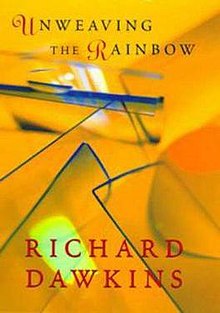 Cover of the first edition | |
| Author | Richard Dawkins |
|---|---|
| Language | English |
| Subject | Evolutionary biology |
| Publisher | Houghton Mifflin |
Publication date | 1998 |
| Publication place | United Kingdom |
| Media type | |
| Pages | 336 pp. |
| ISBN | 0-618-05673-4 |
| OCLC | 45155530 |
| Preceded by | Climbing Mount Improbable |
| Followed by | A Devil's Chaplain |
Unweaving the Rainbow: Science, Delusion and the Appetite for Wonder is a 1998 book by the evolutionary biologist Richard Dawkins, in which the author discusses the relationship between science and the arts from the perspective of a scientist.
Dawkins addresses the misperception that science and art are at odds. Driven by the responses to his books The Selfish Gene and The Blind Watchmaker wherein readers resented his naturalistic world view, seeing it as depriving life of meaning, Dawkins felt the need to explain that, as a scientist, he saw the world as full of wonders and a source of pleasure. This pleasure was not in spite of, but rather because he does not assume as cause the inexplicable actions of a deity but rather the understandable laws of nature.
His starting point is John Keats's well-known, light-hearted accusation that Isaac Newton destroyed the poetry of the rainbow by 'reducing it to the prismatic colours.'[1] See Keats's poem Lamia and Edgar Allan Poe's To Science. Dawkins's agenda is to show the reader that science does not destroy, but rather discovers poetry in the patterns of nature.
- ^ Benjamin Haydon (1929). "Chapter XVII 1816–1817". In Alexander P. D. Penrose (ed.). The Autobiography and Memoirs of Benjamin Robert Haydon 1786–1846 Compiled from his "Autobiography and Journals" and "Correspondence and Table-Talk". Minton Balch & Company, New York. p. 231.
During an 'immortal dinner' 28th December 1817 hosted by Haydon and attended by Wordsworth, Charles Lamb, Keats, and Keats's friend Monkhouse, Keats lightheartedly said Newton 'has destroyed all the poetry of the rainbow, by reducing it to the prismatic colours.' He then proposed a toast to 'Newton's health, and confusion to mathematics' to the amusement of all.